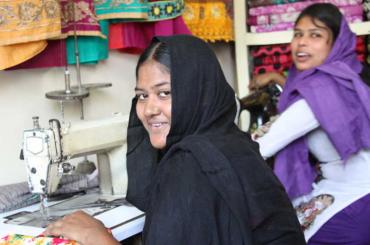

Ahmed Mushfiq Mobarak, a native of Bangladesh, is a Professor of Economics at Yale University with concurrent appointments in the School of Management and in the Department of Economics. He is the Founding Director of the Yale Research Initiative on Innovation and Scale (Y-RISE, yrise.yale.edu). He holds other appointments at Innovations for Poverty Action, the International Growth Centre at LSE, Jameel Poverty Action Lab (J-PAL) at MIT. He is currently collaborating closely with a2i in the Bangladesh government and with BRAC on devising evidence-based COVID response strategies for Bangladesh, and expanding that work in Sierra Leone and Nigeria.
Mobarak has several ongoing research projects in Bangladesh, Brazil, Chile, India, Indonesia, Kenya, and Malawi. He conducts field experiments exploring ways to induce people in developing countries to adopt technologies or behaviors that are likely to be welfare improving. He also examines the implications of scaling up development interventions that are proven effective in such trials. His research has been published in journals across disciplines, including Econometrica, Science, The Review of Economic Studies, the American Political Science Review, Proceedings of the National Academy of Sciences, and Demography, and covered by the New York Times, The Economist, Science, NPR, Wired.com, BBC, Wall Street Journal, the Times of London, and other media outlets around the world. He received a Carnegie Fellowship in 2017.
Recent work by Ahmed Mushfiq Mobarak
-

Understanding rural-urban migration in the developing world
How does encouraging rural-urban migration in the developing world impact welfare?
Published 26.07.23
-

Hitting the jackpot: The high returns of a Malaysia visa lottery for Bangladeshi workers
International migration can be transformative for low-skilled workers and their families, and governments can play important roles to ease the visa intermediation process, lower upfront costs, and ensure safer migration
Published 15.05.23
-

The productivity consequences of pollution-induced migration in China
Productivity losses from pollution through the indirect migration channel are approximately as much as the direct health costs of pollution
Published 11.02.22
-

Catch and release: Regulation and evasion in the Chilean fish market
Less frequent enforcement of regulations on illegal fish sales makes it more difficult for vendors to find loopholes and increases overall compliance
Published 28.07.21
-

Social learning in agriculture: Experimental evidence from Malawi
Can policymakers speed up the adoption of modern agricultural technologies through peer-to-peer learning?
Published 03.06.20
-
The path to scale: Replication, general equilibrium effects, and new settings
As a programme scales, it is important to check that RCT results are replicable and that general equilibrium effects are considered
Published 21.11.17
-

The path to scale: From randomised control trial to scalable programme
An RCT conducted in Bangladesh found positive impacts on incomes and calorie consumption; academics and practitioners work together to scale it
Published 14.11.17
-

Myth-Busting Evidence on the Economic Benefits of Immigration
Mushfiq Mobarak explains how, contrary to popular opinion, immigration creates economic benefits.
Published 01.09.17
-

Manufacturing growth and the lives of Bangladeshi women
The rise of the Bangladeshi garment industry can help explain declining fertility, increasing age at marriage, and increasing educational attainment
Published 04.08.15